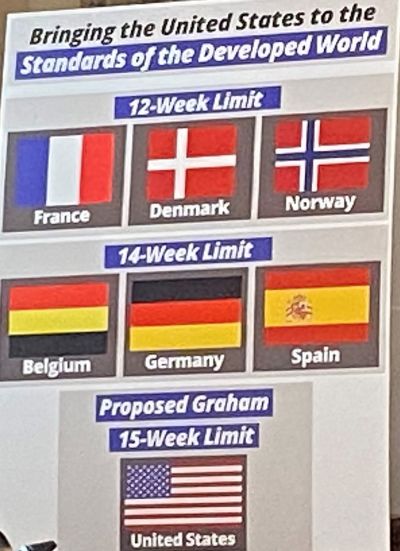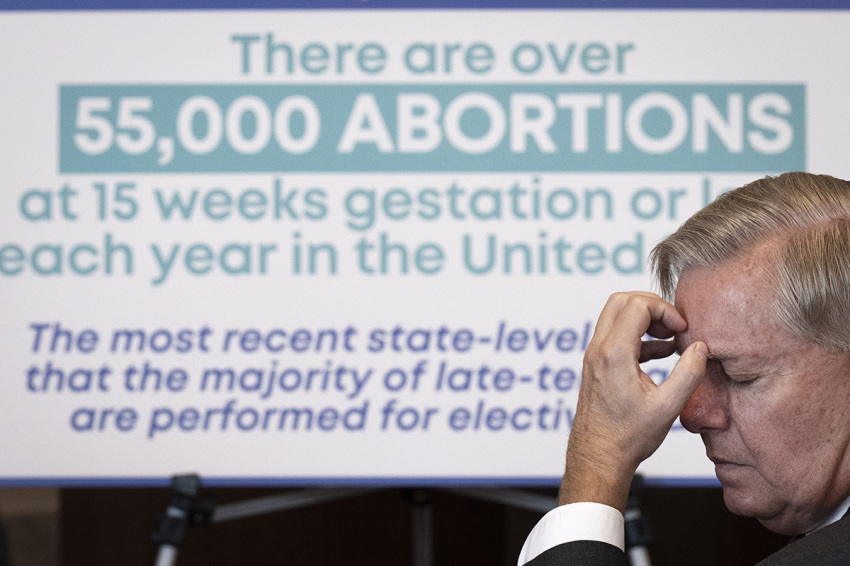Lindsey Graham introduces 15-week abortion ban as pro-lifers seek to put Democrats on defense

WASHINGTON — A 15-week abortion ban has been introduced in the United States Senate, the first pro-life legislation introduced at the federal level since the U.S. Supreme Court overturned the Roe v. Wade decision that legalized abortion nationwide.
Sen. Lindsey Graham, R-S.C., held a press conference alongside pro-life leaders on Capitol Hill Tuesday, unveiling the Protecting Pain-Capable Unborn Children from Late-Term Abortions Act.
The legislation would ban abortion after 15 weeks of gestation and is similar to the Mississippi law that the Supreme Court upheld in Dobbs v. Jackson Women's Health Organization. Along with upholding the Mississippi law, the court declared in Dobbs that “Roe was egregiously wrong from the start” and reversed the 1973 decision.
Rep. Chris Smith, R-N.J., has introduced companion legislation in the House of Representatives. A statement from Smith’s office confirms that the bill has secured the support of more than 80 members of Congress, including Reps. Kat Cammack, R-Fla., Michelle Fischbach, R-Minn., and Andy Harris, R-Md.
The Dobbs decision does not ban abortion nationwide but gives state and federal lawmakers the authority to set limits on abortion or increase gestational ages for abortion. Several states have moved to ban abortion in the weeks following the Dobbs decision, while abortion remains legal up to the moment of birth in other states.
In response to the Dobbs decision, congressional Democrats have restarted their previous efforts to pass the so-called Women’s Health Protection Act, which would codify abortion into federal law and limit the ability of states to pass pro-life laws. Graham characterized his legislation as a response to the Women’s Health Protection Act, which has passed the House but failed to pass the Senate.
At the press conference, Graham compared both the Protecting Pain-Capable Unborn Children from Late-Term Abortions Act and the Women’s Health Protection Act with the abortion laws on the books in other countries. “If we adopted … our bill, we would be in the mainstream of most everybody else in the world. I think there are 47 of the 50 European countries [that] have a ban on abortion from 12 to 15 weeks,” he said.

A graphic on display at the press conference highlighted that France, Denmark and Norway ban abortions after 12 weeks gestation, while Belgium, Germany and Spain prohibit the procedure after 14 weeks gestation. A separate graphic noted that the Democrats' so-called Women’s Health Protection Act “places America in the company of only seven other countries who allow abortion on demand, including North Korea and China.”
Carol Tobias, president of the pro-life group National Right to Life, was among the pro-life leaders who attended the press conference. There, she spoke about the adverse impact the Women’s Health Protection Act would have if passed: “Reasonable limits such as parental consent or women’s right to know laws, which were possible under Roe v. Wade, would not be allowed under the WHPA.”
Graham and the pro-life leaders touted the pro-life legislation as reflective of a consensus on abortion, pointing to a Fox News poll showing that 54% of Americans support banning abortion after 15 weeks gestation, with exceptions for medical emergencies, while just 41% opposed.
The Women’s Health Protection Act is out of touch with mainstream opinion on the issue of abortion, they added, citing a Harvard-Harris poll finding that just 10% of Americans support abortion throughout all nine months of pregnancy.
Additional polling from CBS News and the Pew Research Center measured support for legal abortion throughout all nine months of pregnancy at 17% and 19%, respectively. Emphasizing that Graham’s bill is in keeping with a national consensus on abortion, supporters of the bill also see it as consistent with scientific evidence about fetal development.
As Concerned Women for America President Penny Nance explained at the press conference, “At 15 weeks, a little baby girl can feel pain. She can move her fully formed fingers and her toes. She can suck her thumb and she has a fully developed heart that is pumping 26 quarts of blood per day. This is a human life that deserves our protection.”
Pro-life activists and Republicans see this legislation as an opportunity to put Democrats on defense with less than two months to go until the midterm elections. “Should we look like Iran and North Korea when it comes to national abortion policy or maybe France, Belgium, Germany, Spain, Denmark and Norway?” Graham asked. “If you vote with us, then we’ll look more like these countries. If you vote with the Democrats, we’ll look more like Syria and North Korea and Iran.”

“I want to be a nation as a whole that recognizes at 15 weeks, the baby feels pain, that to save the baby’s life, you have to provide anesthesia because you don’t want to hurt the baby in the process of saving its life, and we are not a better nation by just dismembering that child,” Graham added.
March for Life President Jeanne Mancini, added, “Politicians voting against this bill will stand not only against science, but they will stand against the American public, not to mention standing against basic compassion for women and unborn children.”
Since Dobbs, Republicans have found themselves on defense about abortion. Special election results that have occurred this summer to fill vacancies in the House have caused concern that the issue of abortion is motivating pro-abortion Democratic voters to turn out in higher numbers and will lead to the party overperforming in special elections compared to their district’s voting patterns in the 2020 presidential election.
Public opinion polling has shown that while most Americans support legal abortion at some point in pregnancy, most remain opposed to late-term abortions. A handful of Republicans running for office in swing states have amended their rhetoric about abortion in an effort to appeal to swing voters who take a more nuanced position on abortion.
Specifically, Blake Masters, the Republican nominee running for the Senate seat in Arizona, removed a statement from his website declaring that he would “support a federal personhood law (ideally a constitutional amendment) that recognizes that unborn babies are human beings" and should not be killed. The section of his website devoted to highlighting Masters’ pro-life platform now outlines his intention to “support a law or constitutional amendment that bans late-term (third trimester) abortion and partial-birth abortion at the federal level.”
Masters also revised his vow to “strip funding from Planned Parenthood” by removing his initial inclusion of “all other abortionists” and “any organization that promotes abortion” as those worthy of defunding. Masters also deleted a section of his website promising to “remove funding for any research that uses embryonic stem cell research or aborted fetal remains.”
Scott Jensen, the Republican nominee running for governor in Minnesota, released an ad last week of him insisting that abortion was a “protected, constitutional right” in the state. He also stated that “no governor can change that and I’m not running to do that.” When running for the Republican primary in March, before the Dobbs decision, Jensen said in a Minnesota Public Radio interview that he would “try to ban abortion” if elected.
Graham rejected the idea that “the Republican Party and the pro-life movement is on the run.” The senator vowed that “we’re going nowhere,” adding, “We welcome the debate, we welcome the vote in the United States Senate as to what America should look like in 2022.”
“I don’t think this is going to hurt us. I think it will more likely hurt them when they try to explain to some reasonable person why it’s OK to be more like Iran and less like France on abortion,” he said.
Pro-life groups and Republican candidates for office agree that a refusal to condemn late-term abortion presents a vulnerability for Democrats, especially those running for office in swing states. Masters’ website amended its section on abortion to emphasize the position of his opponent, Democrat Sen. Mark Kelly, on the matter.
“Mark Kelly believes in nationwide abortion on-demand up until the moment of birth, with zero limits,” the website reads. “Only China and North Korea support the extreme no-limits policies that Senator Mark Kelly supports.”
The pro-life group Susan B. Anthony Pro-Life America noted in an advertisement that Kelly voted against the Kennedy Amendment to the federal government’s budget for fiscal year 2022, which would have established penalties for physicians who perform abortions after 20 weeks gestation.
Kelly is not the only swing-state Democrat to implicitly express support for abortion to the moment of birth. Another ad from Susan B. Anthony Pro-Life America highlights the refusal of Rep. Tim Ryan, the Democratic nominee for the open Senate seat in Ohio, Beto O’Rourke, who is running for governor of Texas, and Stacey Abrams, who is seeking the governorship of Georgia for the second time, declining to explicitly support any restrictions on abortion when asked.
A majority of Americans support common sense limits on abortion. (See: https://t.co/xBGvPracxj)
— SBA Pro-Life America LifeSavingLaws.com (@sbaprolife) August 31, 2022
But these Democratic Senate candidates seem unable to name a SINGLE limit on abortion that they would support: pic.twitter.com/9rIDSeNl4s
John Fetterman, the Democratic nominee for the open Senate seat in Pennsylvania, responded with a “No” when asked if he supported any limits on abortion.
"Are there any limits on abortion you would find appropriate?"
— RNC Research (@RNCResearch) September 5, 2022
PA Democrat John Fetterman: “No."pic.twitter.com/WaYJke2I2J
Graham stressed that the results of the midterm elections will likely determine the fate of his bill: “If we take back the House and the Senate, I can assure you we’ll have a vote on our bill. If the Democrats are in charge, I don’t know if we’ll ever vote on our bill.”
The bill is unlikely to be brought up for a vote in either chamber of Congress as long as Democrats remain in charge. The FiveThirtyEight Deluxe model, which predicts the results of elections based on “polls, fundraising, past voting patterns” as well as the opinions of political experts currently gives Republicans a 72% chance of retaking the House, while giving Democrats a 72% chance of maintaining control of the Senate.
Even if the bill were to pass both chambers of Congress, President Joe Biden, an outspoken opponent of the Dobbs decision, would likely veto it. Graham expressed optimism that “if we stay on this and keep talking about it, maybe less than a decade from now, this will be law.”
Ryan Foley is a reporter for The Christian Post. He can be reached at: ryan.foley@christianpost.com



























